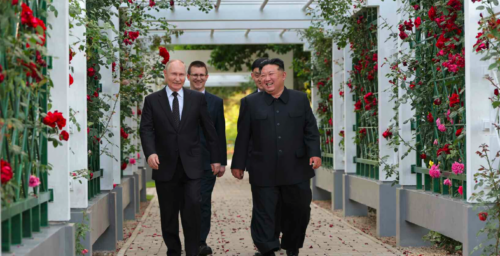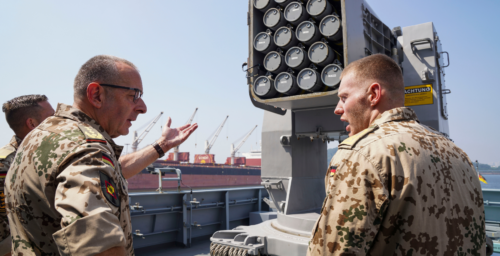Japanese Prime Minister Fumio Kishida visited Seoul on 6-7 September 2024 for a summit with South Korean President Yoon Suk Yeol. It was a farewell...
Vous n'êtes pas connecté
- English
- Français
- عربي
- Español
- Deutsch
- Português
- русский язык
- Català
- Italiano
- Nederlands, Vlaams
- Norsk
- فارسی
- বাংলা
- اردو
- Azərbaycan dili
- Bahasa Indonesia
- Հայերեն
- Ελληνικά
- Bosanski jezik
- українська мова
- Íslenska
- Türkmen, Түркмен
- Türkçe
- Shqip
- Eesti keel
- magyar
- Қазақ тілі
- Kalaallisut ; kalaallit oqaasii
- Lietuvių kalba
- Latviešu valoda
- македонски јазик
- Монгол
- Bahasa Melayu ; بهاس ملايو
- ဗမာစာ
- Slovenščina
- тоҷикӣ ; toğikī ; تاجیکی
- ไทย
- O'zbek ; Ўзбек ; أۇزبېك
- Tiếng Việt
- ភាសាខ្មែរ
- རྫོང་ཁ
- Soomaaliga ; af Soomaali
Rubriques :
 Maroc - EURASIAREVIEW.COM - A la une - 28/Aug 11:40
Maroc - EURASIAREVIEW.COM - A la une - 28/Aug 11:40
A Path To Reconciliation: Overcoming Historical Grievances And Geopolitical Tensions In Korea – Analysis
The Korean Peninsula has been one of the most volatile and enduring flashpoints of conflict in the world since its division at the end of World War II. The question of which entity – North Korea or South Korea – legitimately represents the Korean people remains a major source of exacerbated tension due to the strategic interests of major powers such as the United States, Japan, Russia, and China. These conflicting interests often lead to a lack of responsibility for maintaining peace and stability in the region. Furthermore, the historical context of Korea’s division, marked by colonial occupation and war, continues to influence the present-day geopolitical landscape. This essay argues that a comprehensive approach to resolving the Korean Peninsula issue must consider the complexities of representation, the role of major powers, and historical grievances. It also proposes that the involvement of neutral bridge builders and Track II diplomacy could provide a viable path towards lasting peace and reconciliation. Analysis of Representation and Legitimacy The issue of representation is central to the Korean Peninsula conflict. Both North Korea (Democratic People’s Republic of Korea – DPRK) and South Korea (Republic of Korea – ROK) claim to be the legitimate government of the entire Korean Peninsula. North Korea, under the Kim dynasty, promotes a Juche ideology centred on self-reliance and authoritarian rule, while South Korea has developed a democratic political system with a capitalist economy. This ideological and political divide has deepened over time, making the prospect of reunification increasingly complex. South Korea, with its international recognition and economic prosperity, is often seen as the more legitimate representative of the Korean people in the eyes of the global community. However, North Korea maintains control over its population through strict authoritarian rule and its significant nuclear capabilities give it leverage in international relations. The different political ideologies, coupled with contrasting economic systems and social structures, have resulted in a deeply rooted divide that transcends mere geographical separation. Achieving consensus on who truly represents the Korean people is therefore a fundamental challenge in any peace negotiations. Role of Major Powers and Lack of Responsibility The involvement of major powers, namely the United States, Japan, Russia, and China, further complicates efforts to resolve the Korean Peninsula issue. Each of these countries has strategic interests in the region, often prioritizing their own national security and economic goals over the pursuit of peace and stability on the Korean Peninsula The United States and Japan, as key allies of South Korea, have a vested interest in curbing North Korea’s nuclear ambitions and promoting stability in the region. U.S. military presence in South Korea and Japan serves as a deterrent against North Korean aggression but also raises tensions as North Korea views this as a direct threat to its sovereignty. Japan, on the other hand, has historical grievances with both Koreas and a deep concern over North Korea’s missile tests and nuclear capabilities, which directly threaten security. China and Russia, by contrast, have often acted as protectors of North Korea, fearing that the collapse of the North Korean regime could lead to a unified Korea allied with the United States, thereby altering the balance of power in East Asia. Both countries have provided economic and diplomatic support to North Korea, often undermining international sanctions aimed at curtailing Pyongyang’s nuclear program. This support is driven by strategic considerations, including the desire to maintain a buffer state between themselves and U.S. military forces in South Korea. The interests of these major powers have led to a lack of coordinated action toward peace. The focus on strategic advantage rather than collective responsibility has hindered progress in negotiations, leaving the Korean Peninsula in a perpetual state of tension and instability. Historical Context and Division The division of the Korean Peninsula has its roots in the colonial and wartime history of the early 20th century. Korea was annexed by Japan in 1910, and for 35 years, it endured harsh colonial rule. Following Japan’s defeat in World War II in 1945, Korea was divided along the 38th parallel by the United States and the Soviet Union. This division was intended as a temporary measure but quickly solidified into a permanent split as Cold War tensions escalated. The Korean War (1950-1953) began when North Korea attempted to unify the peninsula by force, resulting in a devastating conflict that left millions dead and the country divided along the Demilitarized Zone (DMZ). The armistice agreement in 1953 ended active hostilities but did not lead to a peace treaty, leaving North and South Korea technically still at war. The war and its aftermath have left deep scars on both societies, with families separated by the DMZ and a pervasive sense of mistrust that continues to this day. The historical legacy of division has profoundly shaped the political, economic, and social landscapes of both North and South Korea. In the North, the war justified the regime’s emphasis on military strength and self-reliance, while in the South, the threat of northern aggression became a driving force behind economic development and military readiness. The enduring presence of the DMZ stands as a stark symbol of the unresolved conflict and the challenges of reconciliation. Potential Solutions The Role of a Bridge Builder To address challenges on the Korean Peninsula, it is necessary to take a more nuanced and inclusive approach that considers the perspectives of both North and South Korea, beyond the interests of major powers. One potential strategy is to involve neutral bridge builders who can facilitate dialogue and promote understanding between the two Koreas. Countries like Indonesia and Mongolia, which have diplomatic relations with both North and South Korea, are well-suited for this role. By leveraging their neutrality and diplomatic experience, these nations can provide a platform for dialogue that is not influenced by the strategic interests of major powers. For example, Indonesia, as a member of ASEAN, can promote peace efforts based on ASEAN’s principles of non-interference and consensus-building. ASEAN’s experience in managing regional conflicts and fostering cooperation can serve as a model for peace initiatives on the Korean Peninsula Track II Diplomacy Involving non-governmental organizations, academic institutions, and cultural exchanges, can also play a crucial role in building trust and fostering communication between the North and South. People-to-people interactions, such as sports, academic exchanges, collaborations, and joint cultural projects, can help break down stereotypes and create a foundation for more formal diplomatic negotiations. These informal channels of communication are essential for reducing tensions and creating a conducive environment for dialogue. Recommendations 1. Promote Inclusive Dialogue: Engage both North and South Korea in dialogue that acknowledges their respective concerns and aspirations. Encourage neutral mediators, including ASEAN countries and Mongolia, to facilitate these discussions.2. Strengthen Multilateral Cooperation: Major powers should commit to a coordinated approach that prioritizes peace and stability over strategic competition. Establish a multilateral framework that includes all stakeholders to address security concerns and promote denuclearization. 3. Enhance People-to-People Exchanges: Expand track II diplomacy initiatives to include more cultural, academic, and humanitarian exchanges. These efforts can build trust and understanding, laying the groundwork for formal negotiations. 4. Address Historical Grievances: Acknowledge and address the historical injustices and suffering caused by the Korean War and division. Establish truth and reconciliation commissions to facilitate dialogue and promote healing Conclusion In conclusion, to effectively address the challenges on the Korean Peninsula, a more nuanced and inclusive approach is required, which considers the perspectives of both North and South Korea. The involvement of neutral mediators, such as Indonesia and Mongolia, along with increased people-to-people exchanges and efforts to address historical grievances, can contribute to fostering dialogue and creating a conducive environment for peace and stability. The Korean Peninsula conflict is deeply rooted in issues of representation, major power dynamics, and historical grievances. The involvement of neutral bridge builders and the promotion of Track II diplomacy offer viable pathways to peace, emphasizing dialogue, mutual understanding, and inclusive cooperation. For lasting peace to be achieved, all stakeholders must prioritize collective responsibility over individual strategic interests. Only through a comprehensive and collaborative approach can the Korean Peninsula move towards reconciliation and stability, ending decades of division and hostility. The opinions expressed in this article are the author’s own. References Oberdorfer, Don. The Two Koreas: A Contemporary History. Basic Books, 2001. Cumings, Bruce. Korea’s Place in the Sun: A Modern History. W.W. Norton & Company, 2005. Armstrong, Charles K. The Koreas. Routledge, 2013. Cha, Victor. The Impossible State: North Korea, Past and Future. HarperCollins, 2012. Kim, Samuel S. The Two Koreas and the Great Powers. Cambridge University Press, 2006.
Articles similaires
Bo Ram Kwon: How cooperation with Russia has emboldened North Korea
Cooperation between North Korea and Russia across various sectors has gone from strength to strength in recent years, with major implications for the...
Bo Ram Kwon: How cooperation with Russia has emboldened North Korea
Cooperation between North Korea and Russia across various sectors has gone from strength to strength in recent years, with major implications for the...
Putin’s Mediation Proposal: Can China, Brazil, And India Navigate The Ukraine Crisis? – Analysis
Introduction In a significant diplomatic move, Russian President Vladimir Putin has put forward a proposal to address the protracted conflict in...
Wellington’s New Regional Friendshoring – Analysis
Malaysia - New Zealand ties are in a prime state for elevation, especially amidst the era of greater geopolitical uncertainties and challenges and...
Wellington’s New Regional Friendshoring – Analysis
Malaysia - New Zealand ties are in a prime state for elevation, especially amidst the era of greater geopolitical uncertainties and challenges and...
German military chief stresses need to coordinate with Seoul over North Korea
Germany’s military chief emphasized the need for greater coordination with South Korea against threats from North Korea and Russia on Monday, as...
German military chief stresses need to coordinate with Seoul over North Korea
Germany’s military chief emphasized the need for greater coordination with South Korea against threats from North Korea and Russia on Monday, as...
The Future Of Global Peace: Why The UNSC Needs Comprehensive Reform – Analysis
The United Nations Security Council (UNSC) has long been considered to be the foundation of global peace and security. However, its existing...
Manipur Escalation Draws Attention To Myanmar – OpEd
Thesharp escalation by the Kuki militantsin Manipur has shaken up the Indian establishment but the ensuing jingoistic outcry in sections of the...
Les derniers communiqués
-
Adobe Brings Conversational AI to Trillions of PDFs with the New AI Assistant in Reader and Acrobat
Adobe - 21/02/2024
-
Laura Frigenti takes the Helm as Chief Executive Officer of the Global Partnership for Education
Global Partnership for Education - 05/12/2022

